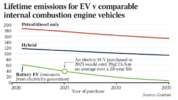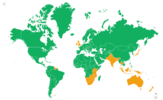- Joined
- 29 January 2006
- Posts
- 7,228
- Reactions
- 4,476
Federal subsidies, tax breaks and the like are presently not needed because it's near impossible to buy a BEV that you can drive away. Wait times for delivery of 3 to 6 months are a good outcome and in some cases - as in Kia's Award winning EV6 - you cannot even use their buying portal because they don't know when next availability will be. Talk to anyone who tried unsuccessfully (like my neighbour) to buy one of the 240 of Hyundai's Ionic 5 when they became available for online purchase last year about how hard it still is to get one. Anyone who put a deposit on Tesla's Cybertruck has to wait until 2030.? I hope that you are better at investing than you are at accusations and fact finding.
View attachment 138470
On the other hand, any subsidies or tax breaks that could be offered would be offset by the safety and health benefits which were quantified earlier in this thread. So while in the short term incentives are not needed, there nevertheless is a good case for offering them when availability improves. There is also the significant contribution that BEVs will make towards getting to our CO2 emissions target:





